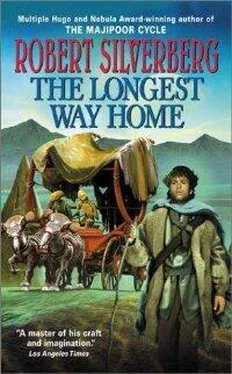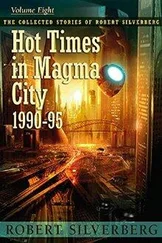Besides, the combinant was his . He had little enough left of the life that once had been his in the days when he had been Joseph Master Keilloran. What if they found the device so interesting that they decided to keep it—looking upon it, say, as one additional benefit that they were getting in return for the trade-goods they had given the fern-gully people for Joseph?
And that was exactly what they seemed to intend. The three Indigenes turned and started to go from the room, taking the combinant with them.
“Wait a minute,” Joseph said. “That instrument is mine. You may not have it.”
They paused by the door and looked back at him. Their expressions, insofar as he could interpret them at all, appeared to register surprise that he had said something. They did not show any indication that they had understood what he said, although he was sure that they had.
He held out his hand. “Give it to me,” he said, using the supplicatory mode. “I have need of it.”
What an Indigene of the Ardardin’s village would have replied, was, almost certainly, “I recognize your need,” and then it would have handed the combinant over. But these people recognized nothing. Once more they turned to leave.
“No,” Joseph said. “I must have it. Give it to me.” Not using the supplicatory any more: this was a direct request. And, when he saw that they were paying no heed, he followed it with the same statement phrased in the rarely used mode reserved for outright commands, which in this context might well be construed as insulting. It made no difference. They did not care about his grammar; probably they were amazed that he could utter intelligible words at all. But his wishes, his pleas, his orders, were equally unimportant to them. They went from the room and his combinant went with them.
Let them have it, Joseph thought sullenly, when his first surge of anger and frustration had died away. It was broken anyway.
Although he knew it meant leaving the combinant behind, he was still resolved to make his escape. The dry weather of recent days was still holding. It was senseless to stay among the Indigenes any longer. Not a day, not an hour, not a moment. He would depart this very night.
With a sense of growing excitement, even jubilation, he made his preparations, stuffing his pack with as much dried meat and berries as it would hold, filling with fresh water the wine-flask from Getfen House that had served as his canteen during his days in the forest, rolling up the mantle of dark furs an earlier village had given him and tying it around his waist. He looked into the corridor. No one seemed to be on guard out there.
The night was clear and cold, though not as cold as some recent nights had been. The stars of the Manza sky, which once had looked very strange to him but by now were only too familiar, wheeled overhead. The only moon that was visible was fast-moving little Mebriel, hardly brighter than a star itself. A dull red glow in the east, behind the mountains, told Joseph that big Sanivark would probably be coming over the horizon soon, lighting everything up with its brick-red beams, but he hoped to have this place well to his rear before that happened.
A bonfire was burning in the village plaza. The sound of singing voices drifted through the air. The Indigenes seemed to gather there most nights after dark, heedless as ever of the cold. Joseph turned and headed in the other direction, down past the infirmary and the town midden. Earlier that day he had seen a path that went behind the midden and seemed to lead on downslope into the woods that lay west of town.
He passed a couple of shadowy figures as he went. They gave him quick glances, but no one stopped him, no one questioned him. He was not a prisoner here, after all. And the barrier of reserve that existed between these people and him protected him now. Still, he wished he had not been noticed. If his disappearance bothered them when they found him gone in the morning, this would give them a clue as to the direction he had taken.
The path was steeper than he had expected. The village’s entire site sloped sharply to the west at something like a twenty-degree grade before the far side of the saddle-shaped valley in which the town was contained turned upward again, but the grade was irregular, flattening out in some places and dropping sharply in others. More than once Joseph found himself struggling down the side of what was essentially a huge ravine. The path quickly deteriorated too, now that he was some distance from town, so that in the moonlit darkness he could barely find it among all the brambles and woody briars that were encroaching on it, and on two occasions he wandered from it altogether and had to grope his way back. At all times he picked his way carefully, mindful of his agonizing stumble in the Getfen forest. Haste could be disastrous. His twisted knee had long since healed, but he knew that another such injury, out here by himself in these frosty woods, would mean the end of him.
Creatures hooted in the night. There were rustlings and cracklings all around him. He ignored all that. He forced himself steadily onward, moving as fast as he dared, guiding himself by a big icy-looking star that lay dead ahead. The only thing that mattered right now was putting distance between himself and the Indigene village.
It was hard work. Though Joseph had grown accustomed to the altitude after so many weeks in the mountains, he felt the strain of it nevertheless: his heart boomed in his chest and his breath came short, and for long stretches he found himself panting, which dried out his mouth and tempted him to dip into his precious water supply. He fought the temptation back. In this mountain saddle the drainage patterns were all wrong for streams, and he could not say when or where he would find his next source of fresh water: on the other side of the slope, no doubt.
But then the path showed signs of beginning to turn upward, and the ascent became a continuous one, which told him that he had finally reached the far side of the saddle, the shallow western rise that separated the village from the lowlands beyond. With his goal so close, Joseph stepped up his pace, pushing himself to the limits of his strength. The warmth of his own exertions protected him against the cold. He could feel streams of sweat running down the sides of his rib-cage, not an unpleasant sensation, as he forced himself up the steep trail. There would be time to rest later. He prayed for an easy descent into the lowlands once he was over the summit of the western ridge.
By the time Joseph attained it, though, he could see that no such easy descent was going to be granted him. Sanivark, emerging at last above the top of the mountains of the east with little Keviel trailing along behind, gleamed like a red lantern over his head, showing him the disheartening sight of a second saddle rolling just to the west of him, and what looked very much like a third one westward of that. Neither one had been visible from the village. He would have to cope with both of them, and who knew what obstacles beyond those, before he reached the lowlands.
He did not seem to be the object of any pursuit, at any rate. The village was only dimly visible, gratifyingly far behind him to the east—the smoke of its bonfire, the lights of a few of its houses—and there was no sign that anyone was moving toward him through the scrubby woods between there and here that he had just traversed. So he was free, no longer a commodity, no longer trade-goods being passed on from village to village. His only problem now was staying alive in these wintry woods.
He crouched for a time to the leeward of the saddle-top, catching his breath, letting his sweat dry, nibbling a bit of dried meat, studying the terrain ahead. But there was not going to be any rest for him. When he had stayed there long enough so that he was starting to feel the cold again, Joseph picked up and moved along, scrambling down into the second saddle and onward into the third, which turned out to be a low flattened basin offering no real challenge. The trail had given out, or else he had lost it, but that scarcely mattered. He was fully in the rhythm of it. He moved on and on. There were no more ridges: it was a straight downhill glide now into the misty lands below.
Читать дальше












